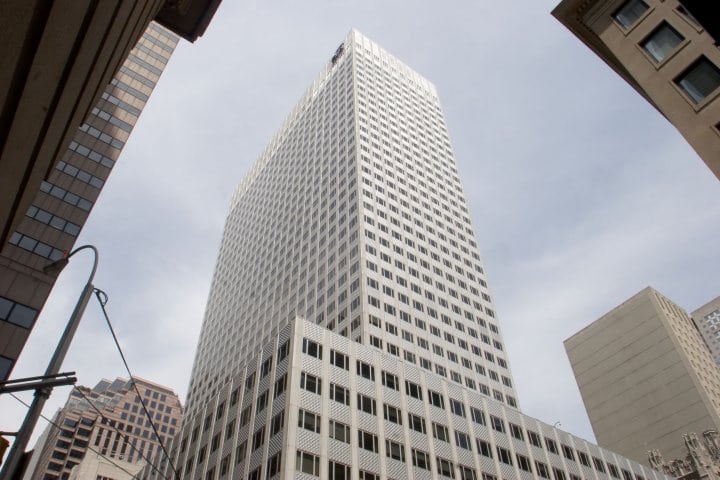Wendy Dent, Ed Pilkington, and Shaun Walker write for The Guardian:
Jared Kushner, the son-in-law of Donald Trump, who acts as his senior White House adviser, secured a multimillion-dollar Manhattan real estate deal with a Soviet-born oligarch whose company was cited in a major New York money laundering case now being investigated by members of Congress.
A Guardian investigation has established a series of overlapping ties and relationships involving alleged Russian money laundering, New York real estate deals and members of Trump’s inner circle. They include a 2015 sale of part of the old New York Times building in Manhattan involving Kushner and a billionaire real estate tycoon and diamond mogul, Lev Leviev.
The ties between Trump family real estate deals and Russian money interests are attracting growing interest from the Justice Department’s Special Counsel, Robert Mueller, as he seeks to determine whether the Trump campaign collaborated with Russia to distort the outcome of the 2016 race. Mueller has reportedly expanded his inquiry to look at real estate deals involving the Trump Organization, as well as Kushner’s financing.
Kushner went before the US Senate intelligence committee on Monday in a closed session of the panel’s inquiry into Russian interference in the election in what could be a pivotal hearing into the affair.
See TrumpWatch, Day 186: Kushner Denies Collusion With Russia
Money Laundering and a Suspicious Death
Leviev, a global tycoon known as the “king of diamonds”, was a business partner of the Russian-owned company Prevezon Holdings that was at the center of a multimillion-dollar lawsuit launched in New York. Under the leadership of US attorney Preet Bharara, who was fired by Trump in March, prosecutors pursued Prevezon for allegedly attempting to use Manhattan real estate deals to launder money stolen from the Russian treasury.
The scam had been uncovered by Sergei Magnitsky, an accountant who died in 2009 in a Moscow jail in suspicious circumstances. US sanctions against Russia imposed after Magnitsky’s death were a central topic of conversation at the notorious Trump Tower meeting last June between Kushner, Donald Trump Jr,, Trump campaign manager Paul Manafort, and a Russian lawyer with ties to the Kremlin.
Donald Jr. and Manafort have been called to testify before the Senate judiciary committee on Wednesday, at which they are certain to face questions about the Trump Tower encounter.
Two days before it was due to open in court in May, the Prevezon case was settled for $6m with no admission of guilt on the part of the defendants. But since details of the Trump Tower meeting emerged, the abrupt settlement of the Prevezon case has come under renewed scrutiny from congressional investigators.
Four Russians attended the meeting, led by Natalia Veselnitskaya, a lawyer with known Kremlin connections who acted as legal counsel for Prevezon in the money laundering case and who called the $6m settlement so slight that “it seemed almost an apology from the government”. Sixteen Democratic members of the House judiciary committee have now written to the justice department in light of the Trump Tower meeting demanding to know whether there was any interference behind the decision to avoid trial.
Constitutional experts are also demanding an official inquiry. “We need a full accounting by Trump’s justice department of the unexplained and frankly outrageous settlement that is likely to be just the tip of a vast financial iceberg,” said Laurence Tribe, Harvard University professor of constitutional law.
Kushner’s Troubled New York Building
Separately, the focus of investigators on Trump family finances stem from the vast flow of Russian wealth that has been poured into New York real estate in recent years. As Donald Trump Jr put it in 2008, referring to the Trump Organization: “We see a lot of money pouring in from Russia.”
Among the overlapping connections is the 2015 deal in which Kushner paid $295m to acquire several floors of the old New York Times building at 43rd street in Manhattan from the US branch of Leviev’s company, Africa Israel Investments (AFI), and its partner Five Mile Capital. The sale has been identified as of possible interest to the Mueller investigation as Kushner later went on to borrow $285m in refinancing from Deutsche Bank, the German financial house that itself has been embroiled in Russian money laundering scandals and whose loans to Trump are coming under intensifying scrutiny.
Court documents and company records show that AFI was cited in the Prevezon case as a business partner of the defendants. In 2008, Prevezon entered a partnership with AFI in which Prevezon bought for €3m, a 30% stake in four AFI subsidiaries in the Netherlands. Five years later, AFI tried to return the money to the Russian-owned company, but it was intercepted and frozen by Dutch authorities at the request of the US government as part of the Prevezon money-laundering investigation.
In Manhattan, Leviev’s firm also sold condominiums to Prevezon Holdings from one of its landmark developments at 20 Pine Street, just a few blocks from Wall Street.
Real estate brochures describe the lavish interior decor of the condominiums, replete with bathrooms bedecked in stone and exotic woods, and boasting “the ultimate in pampering; a sybaritic recessed rain shower”. The 20 Pine Street apartments that Leviev sold to Prevezon were later frozen by US prosecutors seeking to block the flow of what they alleged to be money stolen from the Russian treasury and laundered through New York real estate.
Prevezon’s 20 Pine Street apartments and €3m in assets were all released as part of the settlement in May.

